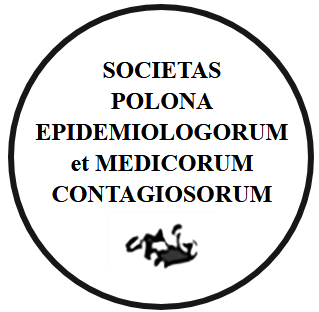REVIEW PAPER
The impact of genetic polymorphism on course and severity of the SARS-CoV-2 infection and COVID-19 disease
1
Klinika Chorób Zakaźnych i Neuroinfekcji, Uniwersytet Medyczny w Białymstoku
2
Zakład Medycyny Populacyjnej i Prewencji Chorób Cywilizacyjnych, Uniwersytet Medyczny w Białymstoku
3
Klinika Kardiologii i Chorób Wewnętrznych z Oddziałem Intensywnego Nadzoru Kardiologicznego, Uniwersytet Medyczny w Białymstoku
These authors had equal contribution to this work
Submission date: 2024-07-13
Final revision date: 2024-09-18
Acceptance date: 2024-10-18
Online publication date: 2024-10-31
Publication date: 2024-12-10
Corresponding author
Przegl Epidemiol 2024;78(3):333-344
KEYWORDS
TOPICS
ABSTRACT
COVID-19 is severe respiratory and systemic disease with complex pathogenesis and many clinical symptoms, including symptoms from respiratory system, immunology system, cardio-vascular system, haematopoietic system and neurological system. Severe character of the disease is associated with occurrence of respiratory failure, septic shock, multiple organ dysfunctions syndrome, which can lead to patients death due to cardiac arrest.
Knowledge about interactions between the virus and human proteins as well as knowledge of immunological mechanisms against infection is a key to identifying the area of virus activity and severity factors of COVID-19. Multiple variants of genes encoding proteins involved in host cell invasion by SARS-CoV-2 virus have been identified: ACE2 i TMPRSS2, TMPRSS11A (HGNC:27954), ELANE (HGNC:3309) oraz CTSL (HGNC:2537), IL-6 rs1800795 variant associated with an increased risk of COVID-19, variant rs35705950:G>T located in the promoter of the MUC5B gene (11p15.5), encoding a protein that plays a key role in maintaining the proper function of the bronchoalveolar epithelium, having a protective effect against the form of the disease requiring hospitalization of the patient, as well as GC rs2282679 gene variant in the vitamin D binding protein associated with a more severe course of COVID-19. 48 of these variants were proved to be directly specific for some populations.
Novel techniques of genome analysis enabled the research of the impact of specific polymorphism variants on the severity of various diseases including, COVID-19. Genetic factors analysis can permit understanding of disease pathogenesis, which is a chance to find effective treatment and prevention methods. Collected data from literature indicate that, in the case of COVID-19 disease, there are genes polymorphisms which affect the severity course.
Share
RELATED ARTICLE
We process personal data collected when visiting the website. The function of obtaining information about users and their behavior is carried out by voluntarily entered information in forms and saving cookies in end devices. Data, including cookies, are used to provide services, improve the user experience and to analyze the traffic in accordance with the Privacy policy. Data are also collected and processed by Google Analytics tool (more).
You can change cookies settings in your browser. Restricted use of cookies in the browser configuration may affect some functionalities of the website.
You can change cookies settings in your browser. Restricted use of cookies in the browser configuration may affect some functionalities of the website.





